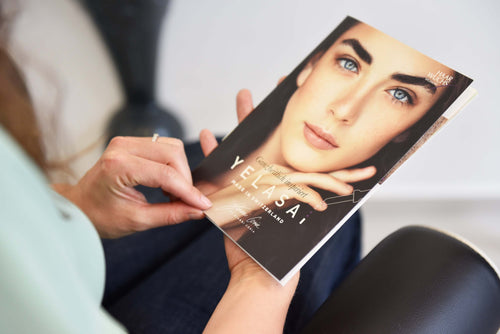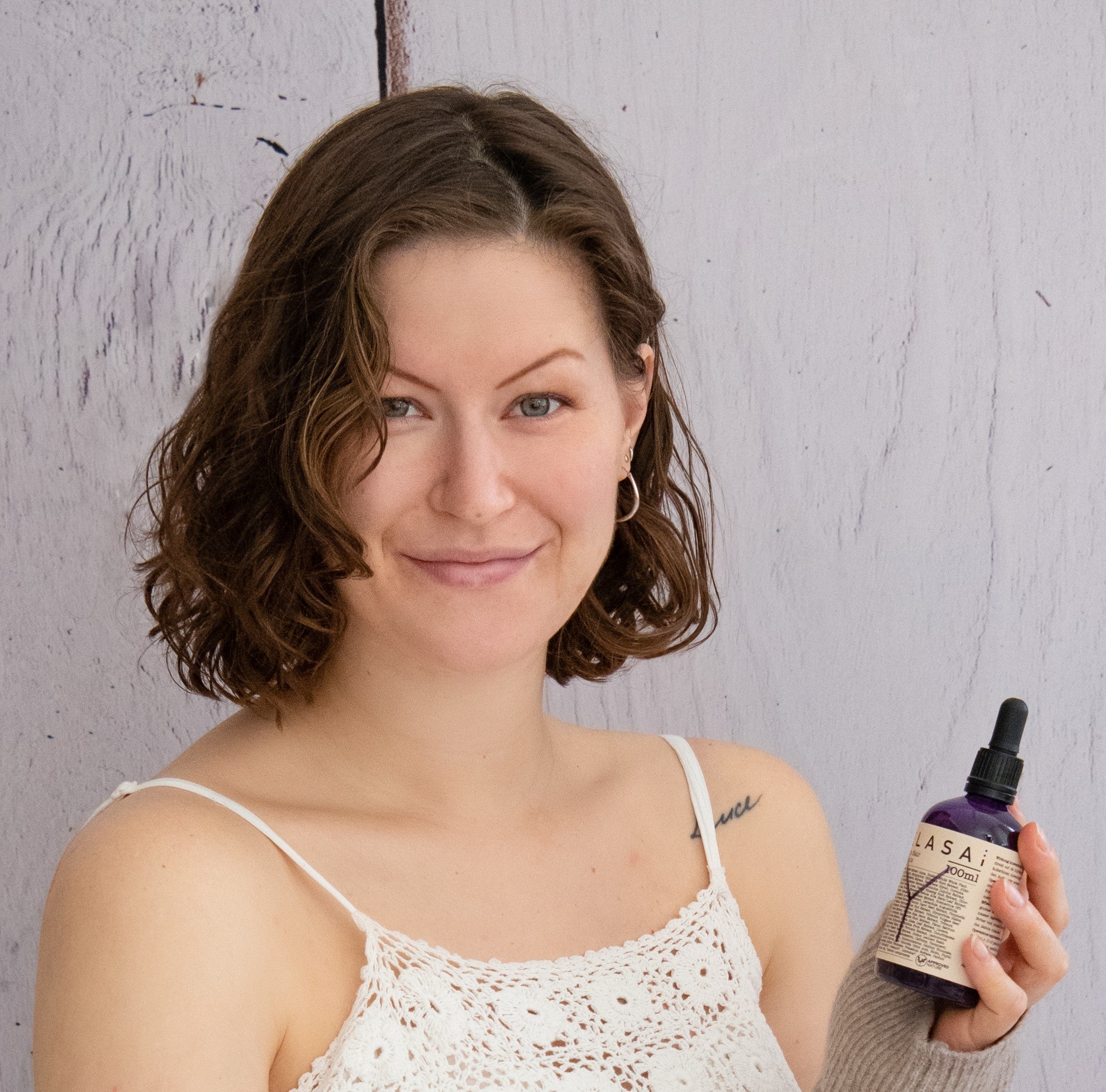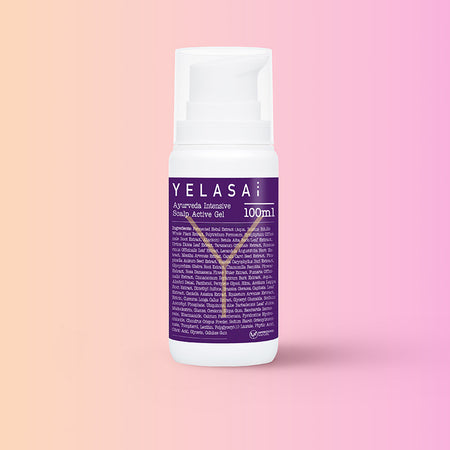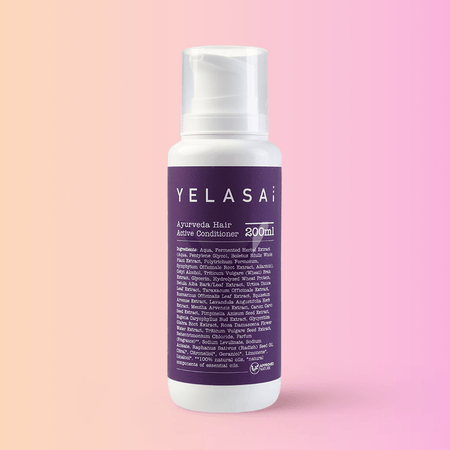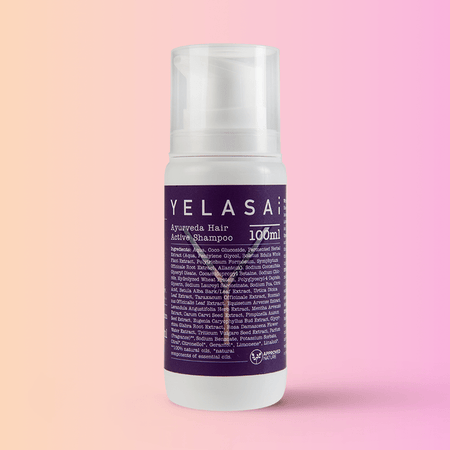Androgenetic alopecia: causes, symptoms & treatment of hereditary hair loss in men and women
Hereditary hair loss is a widespread phenomenon that occurs particularly in men as they age. The hair initially begins to thin in certain areas before it can fall out completely over the years.
Although genetic hair loss is significantly more common in men and can begin before the age of 30, androgenetic hair loss has also become very widespread in women in recent years.
In this article we summarize all the important information about androgenetic hair loss for you. You will find out what symptoms are typical, what the progression looks like and what treatment options are available for hereditary hair loss. We will also show you how you can support your hair growth and scalp with the natural hair care products from YELASAI.
In principle, a hair growth specialist can detect a tendency towards future hair weakening as early as the age of 12. The hair growth specialist uses a micro camera to analyze the scalp and hair quality. Early and active scalp care can counteract a weakening of the hair condition as it promotes the normal functions of the scalp.
What are the symptoms of androgenetic alopecia?
Learn how genetic hair loss manifests itself and how to distinguish it from other forms of hair loss.
Learn moreHow does androgenetic alopecia develop in men?
Find out how androgenetic hair loss occurs in men and what patterns there are.
Learn moreHow does hereditary hair loss manifest itself in women?
Find out how hereditary hair loss manifests itself in women and what symptoms are typical.
Learn moreHow can YELASAI products help people suffering from genetic hair loss?
Find out how YELASAI's natural hair care products can also support you with genetic hair loss.
Learn moreA field report: Natural care even for androgenetic hair loss
A customer was concerned because he noticed that his hair was becoming increasingly thin. He wanted more fullness and was looking for a suitable solution. The issue was already well known in his family - his father had pronounced receding hairlines and a thinning area at the back of his head, as did his uncle on his father's side.
Learn moreWhat are the symptoms of androgenetic alopecia?
When it comes to hereditary hair loss, the symptoms follow a clear pattern. Hair loss begins gradually. Initially, the hair simply becomes thinner in some areas, and then the hair density continues to decrease over time. This can lead to a receding hairline and later bald spots or even baldness.
How quickly hair loss progresses and where it begins varies from person to person. The onset of genetic hair loss can also vary. Some sufferers report that their hair is becoming thinner as early as their mid-20s. In other people, however, hair loss begins much later.
How do I know if I am suffering from hair loss?
Many people find it difficult to correctly assess their hair growth and hair loss. Am I losing a normal amount of hair? Or am I suffering from pathological hair loss? If you notice increased hair loss, you could take intensive care of your scalp and thus stimulate hair growth. You can also contact our YELASAI hair growth specialists who can assess your hair situation. If you think that the hair loss is caused by an illness, then you should consult a doctor.
How does androgenetic alopecia develop in men?
Hereditary hair loss occurs differently in men and women. In men, it usually starts on the forehead and temples. This creates a receding hairline that becomes more pronounced over time. This is usually followed by baldness on the forehead.
Men who suffer from hereditary hair loss often develop bald spots on the top of their heads as a result. Over time, the light spots become closer and closer, so that at some point only a fringe of hair remains.
The course of hereditary hair loss can vary in severity. Genetic hair loss does not necessarily have to lead to baldness: for many of those affected, certain areas of hair remain unaffected for years.
Research has not yet been able to clarify why this is the case. However, it is believed that the areas affected by hair loss are particularly sensitive and therefore the hair there falls out more.
How common is androgenetic hair loss in men?
Eight out of ten men who suffer from hair loss have hereditary hair loss. Genetic hair loss is the most common form of hair loss and affects up to 80 percent of all men. Up to 50 percent of women are affected.
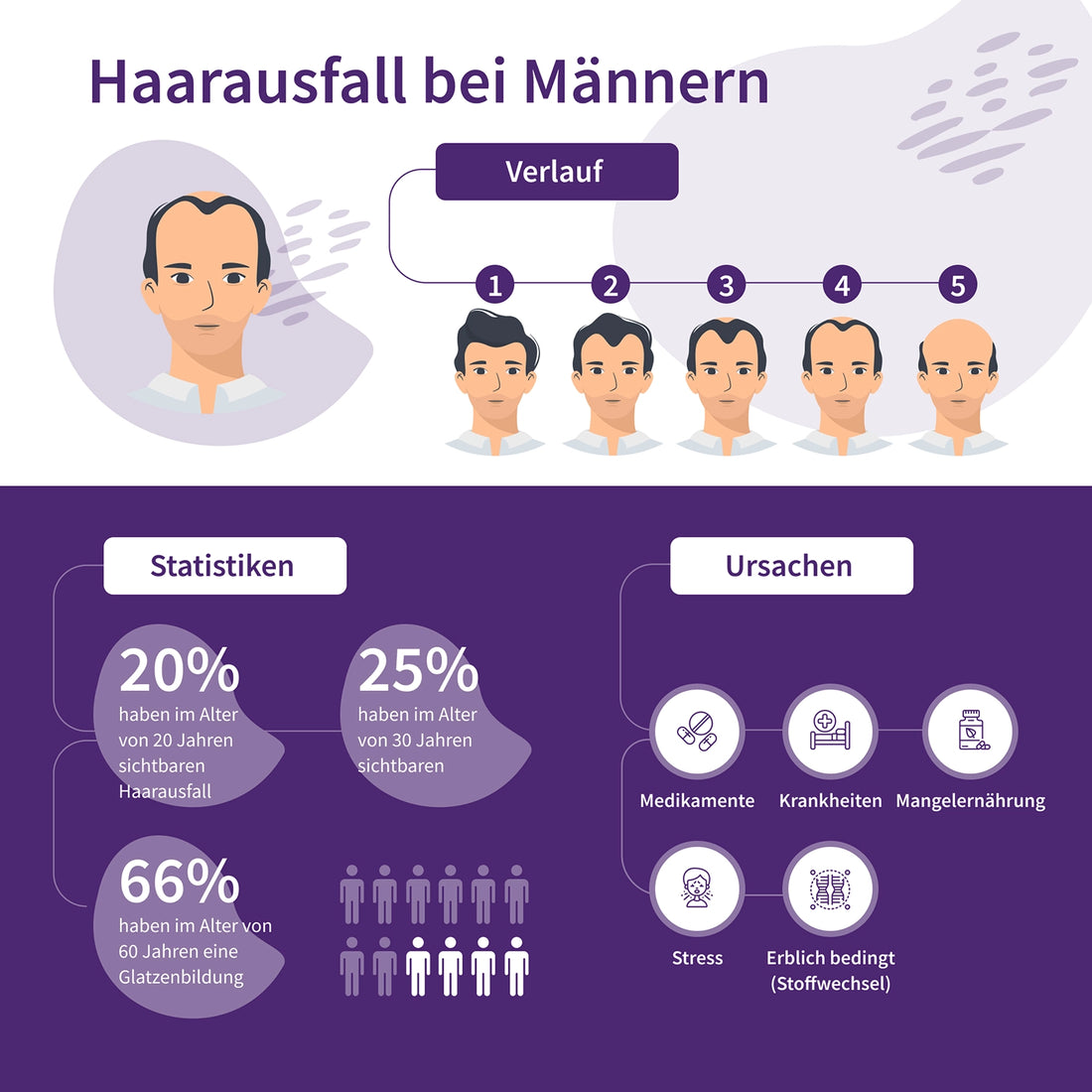
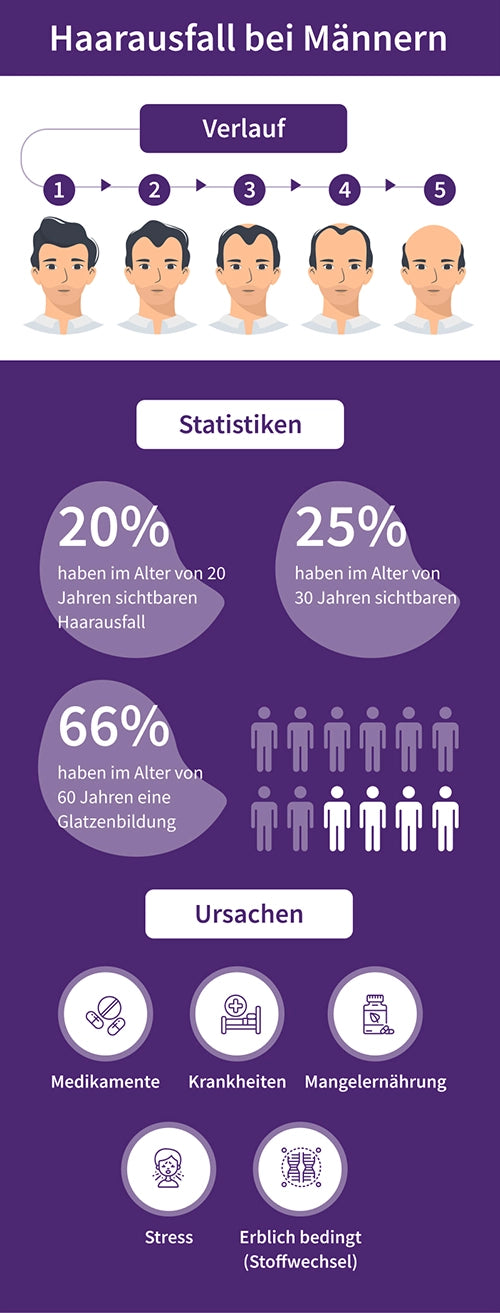
How does hereditary hair loss manifest itself in women?
Hereditary hair loss in women follows a different pattern than in men. In women with hereditary hair loss, the middle parting initially becomes thinner. Over time, the hair thins out and the scalp becomes visible.
Genetic hair loss is less severe in women. The hair does become thinner, but bald spots only rarely appear.
However, women often suffer more from the symptoms than men. Thick hair is very important for many women and they feel uncomfortable or embarrassed when it visibly thins. This psychological burden is also the reason why hair transplantation is becoming increasingly popular among both men and women.
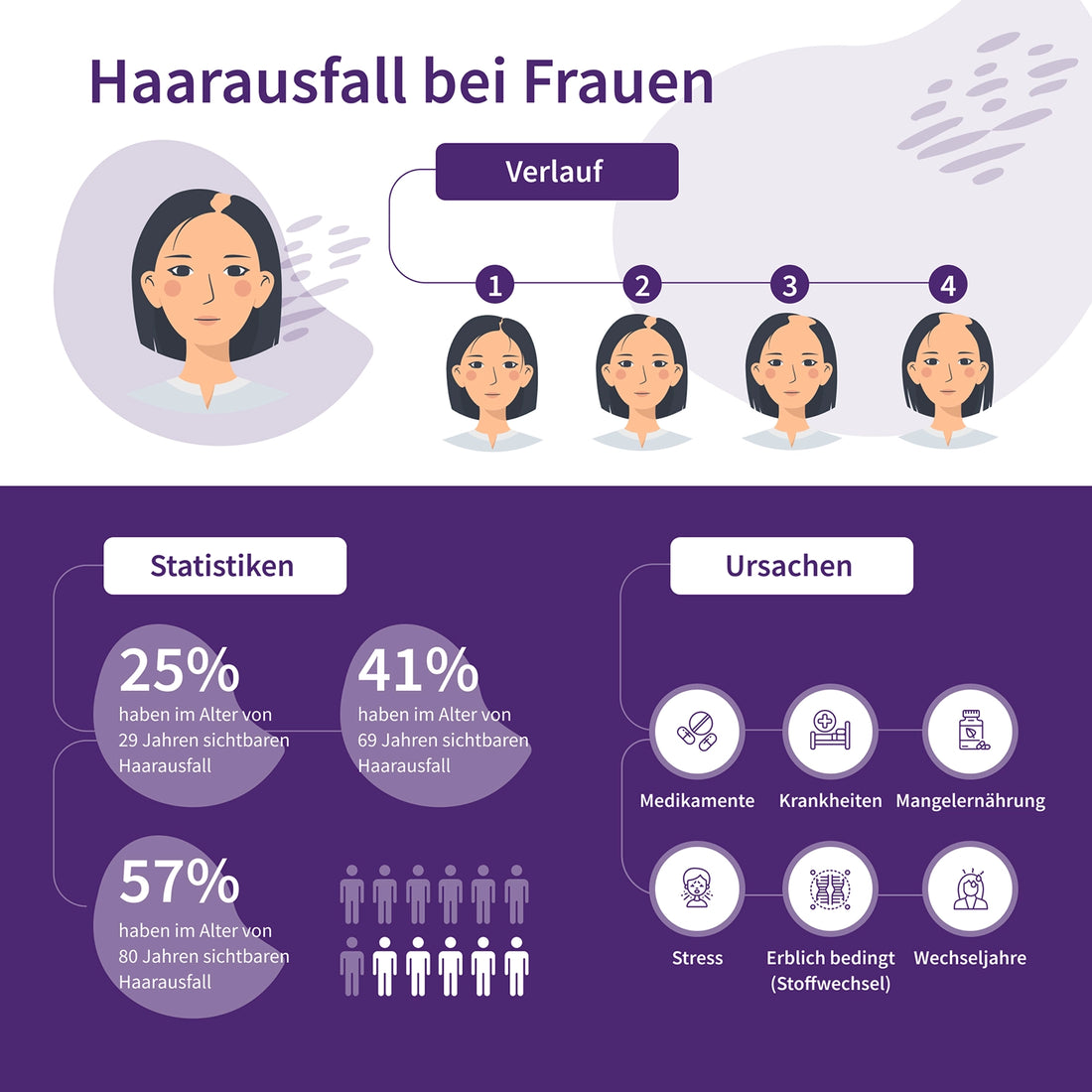
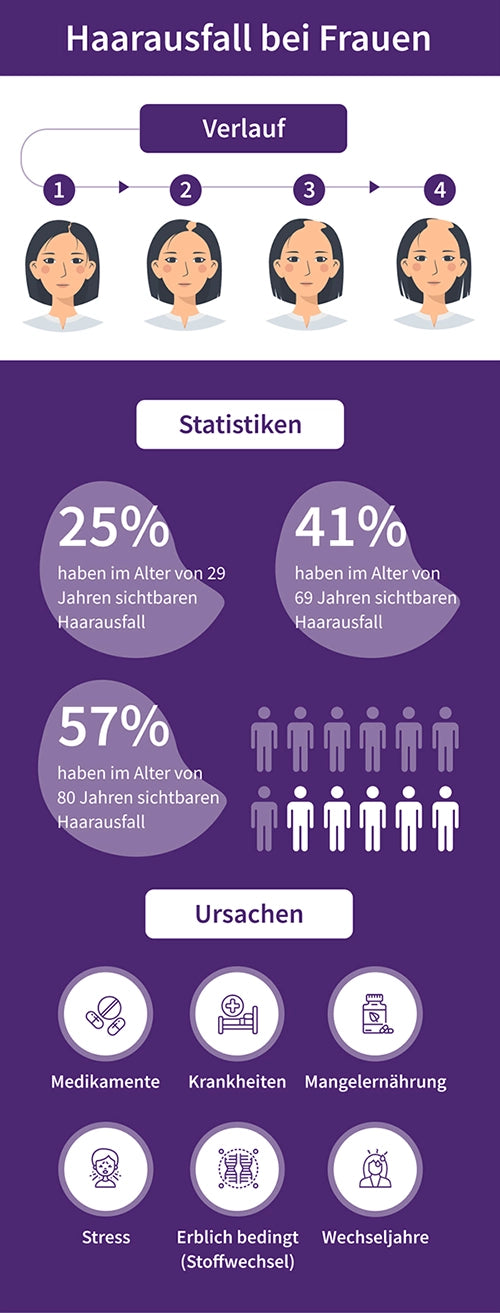
What are the causes of hereditary hair loss?
Research has been able to find out over the years how genetically determined hair loss occurs. Men's hair follicles have increased sensitivity to the sex hormone testosterone. Strictly speaking, it is DHT (dihydrotestosterone).
How much DHT a male body produces and how sensitive the hair follicles are to it is determined by genetic makeup. DHT shortens the growth phase of hair. This means that the hair is more likely to fall out and bald spots form over time. In fact, genetic hair loss is due to predisposition.
Research has made another discovery: the messenger substance prostaglandin D2 is more abundant on the scalp of men. It is therefore suspected that it also slows down hair growth. However, so far there is no means to neutralize this messenger substance.
For many women with hair loss, it only occurs during menopause. This is because less of the hormone estrogen is produced. If the estrogen concentration in the blood falls, the percentage of testosterone automatically increases. This means that the hair roots can be damaged by the DHT.
Can you stop hereditary hair loss?
There are various hair loss remedies that doctors can prescribe. Stopping hair loss is not always possible - but it can be slowed down. It is important that you only take medication after consulting a doctor and getting detailed advice. Hair loss can also have other causes that require specific treatment. For example, a different therapy is recommended for hair loss due to stress than for hair loss during menopause .
The following active ingredients, among others, are used to treat hereditary hair loss:

Minoxidil
The drug minoxidil is a blood pressure medication that can be applied as a solution to your scalp. The solution cannot stop hair loss, but it can make your hair thicker.

Finasteride
The active ingredient finasteride intervenes in the conversion process of testosterone and is only prescribed for men. A tablet is taken once a day, but it can cause serious side effects such as erectile dysfunction or a skin rash.
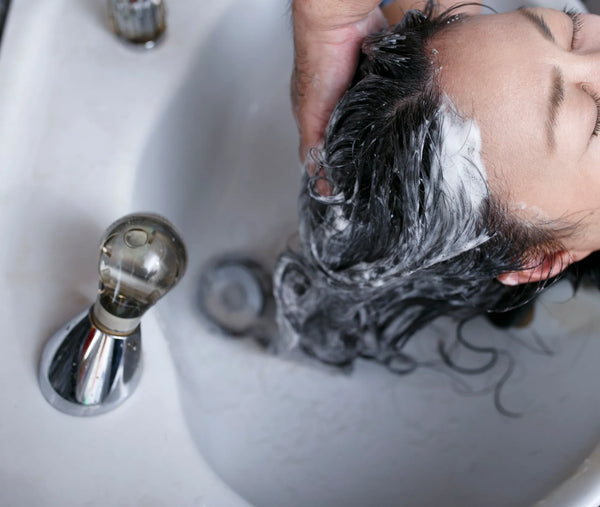
Our recommendation, use YELASAI products
Use YELASAI products even if you have hereditary hair loss. YELASAI's gentle hair care products effectively support natural hair growth. You can get individual advice from our specialized hair growth specialists in your area or browse our online shop.
How can YELASAI products support people with genetic hair loss?
Androgenetic hair loss is widespread. However, you don't just have to accept this: YELASAI hair care products can promote vital hair growth and help you achieve fuller hair. We offer you a wide variety of products, all of which are natural, gentle and gentle so as not to irritate your hair and scalp.
You will find everything you need for your hair care in our range: our Ayurveda Hair Active Shampoo for cleaning your hair and the matchingAyurveda Hair Active Conditioner for silky hair.
If you want to pamper your scalp, we recommend the Ayurveda Hair & Scalp Active Oil . This natural hair oil provides your scalp with valuable nutrients that can promote shiny hair. You can also use the Ayurveda Intensive Scalp Active Gel to care for bald scalp. It cares for your bald scalp and supplies it with important nutrients.
A field report
A few months ago, a client came to me because he was worried about his hair loss and wanted fuller hair again. He knew that hair loss was already an issue in his family, as his father had pronounced receding hairlines and a thinning area at the back of his head, as did his uncle on his father's side.
As a hair specialist, I specialize in hair loss, especially androgenetic hair loss, fine hair and scalp problems, so he contacted me.
I am Melanie Busert and at first I had a rather skeptical client who wondered whether androgenetic hair loss could really be counteracted. However, with patience and a willingness to follow the care treatments consistently, we were able to achieve positive changes through targeted measures. I am delighted to share this story with you today!
The care plan
I conducted a detailed scalp analysis with him to accurately determine the condition of his scalp and hair. Based on the results, I recommended him the Ayurveda Hair Active Tonicwhich he should use twice a day and which stimulates hair growth. Another important component was the regular scalp massage, which we carried out directly in my salon, so that the blood circulation on the scalp is intensively promoted.
The client used the tonic regularly at home and brushed his hair daily with the boar brushwhich also stimulated blood flow to the hair roots. He also used the natural hair growth shampoo for his daily hair wash.
I have to say that I sensed his skepticism at first and he wondered whether the change would really happen. But I encouraged him to remain patient and to continue with the scalp care consistently. We arranged regular follow-up appointments to check the progress and adjust the care applications if necessary.
After about 3-4 months, the client reported the first visible changes. His hair felt firmer and stronger. The hair began to grow thicker, especially in the affected areas. He was delighted with the feeling that the intensive scalp care really had positive effects!
After six months, we celebrated the success together, as the results were clearly visible. His hair was now much fuller and stronger and the hair loss had noticeably reduced. He was particularly pleased to have found a solution without any chemicals or side effects and that he was able to positively influence his natural predisposition to hair loss with purely natural products.
It makes me really happy that my customer was so enthusiastic and saw for himself what is possible! Initially, he had hardly believed that androgenetic hair loss could be effectively influenced and, as I mentioned earlier, was very skeptical. I am all the more pleased that he nevertheless stuck to the treatment and trusted me. Because although androgenetic hair loss is hereditary, a lot can be achieved with the right care - we have experienced this together :)
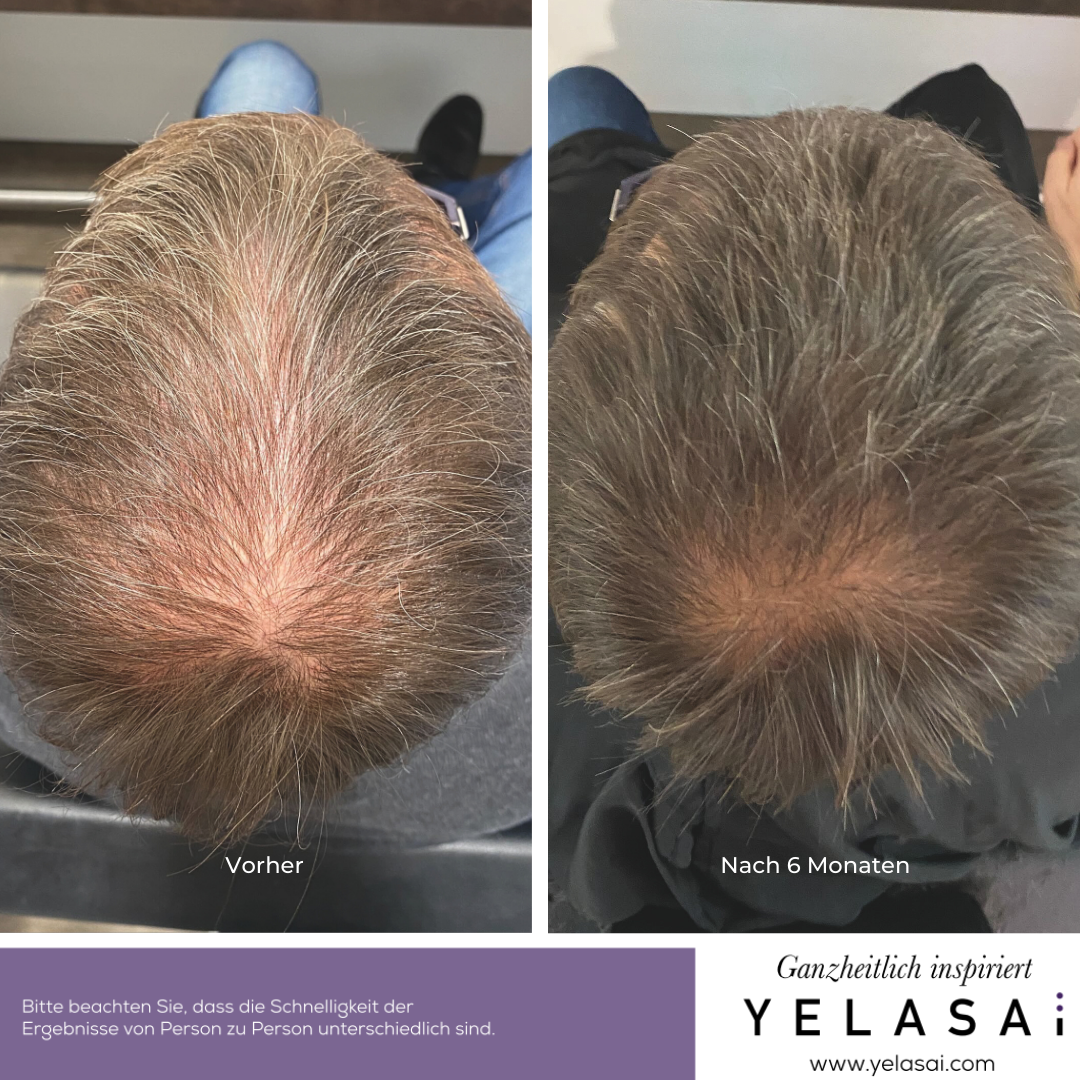

Our conclusion: Use YELASAI hair care products to support genetically caused hair loss
Hereditary hair loss affects many people and can only be alleviated with medication and lotions. It is not yet possible to stop it completely. To support you, you can rely on the natural hair care products from YELASAI.
They care for your hair and scalp and provide them with important nutrients. This can contribute to fuller hair and give your hair more volume. Feel free to take a look around our shop and find the right care products for your hair situation.
